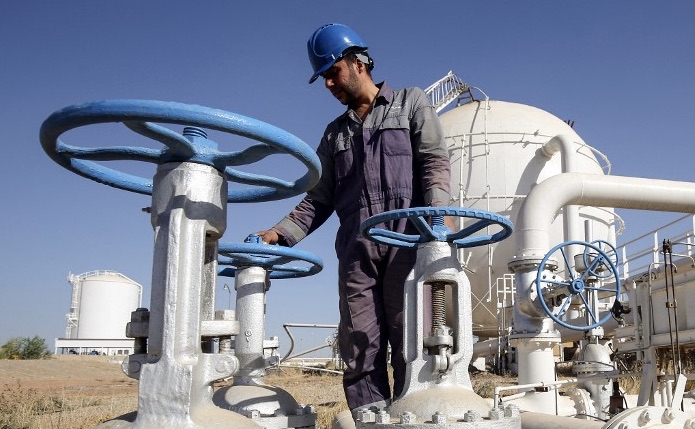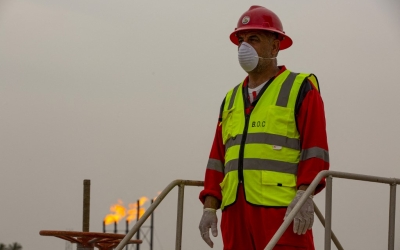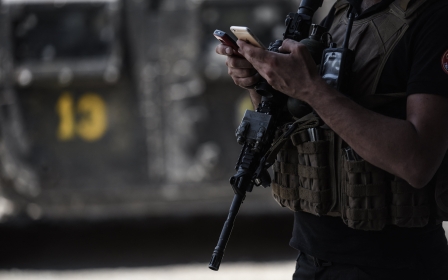Iraq: Kurds denounce 'unjust' oil and gas ruling as energy feud escalates

The long-running saga of the Iraqi-Kurdish energy feud escalated late on Tuesday, when Iraq's autonomous Kurdish region hit back at an order by the country's top federal court for it to hand control of all of its oil and gas to Baghdad.
Earlier on Tuesday, the federal Supreme Court had ordered the Kurdistan Regional Government (KRG) to hand all crude oil in its territories and neighbouring areas directly to the federal government.
The KRG condemned the court ruling as "unjust", saying it "violates the rights and constitutional authorities of the Kurdistan region".
'This will likely not stop the Kurdistan Regional Government from selling its oil, but make it more difficult to sell'
- Abdulla Hawez, researcher
"The Kurdistan Regional Government will not forfeit the rights of the Kurdistan region as codified in the Iraqi constitution, and will continue its attempts to reach a constitutional solution with the federal government on this matter," read a statement issued late on Tuesday.
Masoud Barzani, leader of the Kurdistan Democratic Party (KDP) and former KRG president, said in a statement that the move was an attempt to "antagonise the Kurdistan Region and the federal system in Iraq".
New MEE newsletter: Jerusalem Dispatch
Sign up to get the latest insights and analysis on Israel-Palestine, alongside Turkey Unpacked and other MEE newsletters
The court ruling declared all KRG contracts with oil companies invalid, including agreements on exploration, extraction, export and sales.
The KRG, officially recognised as an autonomous region of Iraq since 2005, has for decades been developing its oil and gas resources independently of the federal Iraqi government, passing its own oil law in 2007 to administer control of resources in its territory.
Abdulla Hawez, an Iraqi Kurdish journalist and researcher, told Middle East Eye that the Supreme Court's decision was very significant, as it marked the "first time in Iraq’s history that the top court... has ruled that the region’s oil and gas exporters are illegal".
A deal struck in 2019 between Baghdad and the Kurdish capital Erbil saw the KRG officially deliver 250,000 of its more than 400,000 barrels of oil per day to Baghdad, in return for its share of the federal budget, which is used to pay the salaries of civil servants and armed forces. However, the KRG has continued to maintain contracts with foreign oil companies independently of Baghdad - an arrangement that is now under threat.
"This will likely not stop the KRG from selling its oil, but it will make it more difficult to sell so it has to trade it at an even steeper discount," said Hawez. "This will increase the pressure on the KRG, which is already facing severe financial pressure."
A troubled relationship
Although there had long been tensions over the KRG's decision to independently sell its oil and gas, things deteriorated significantly after 2014, when the KRG's Peshmerga armed forces seized control of the city of Kirkuk after it was stormed by Islamic State (IS) fighters.
The KRG remained in control of Kirkuk and its lucrative surrounding oilfields until October 2017, when - in the wake of a controversial independence referendum in the Kurdish region - Baghdad's forces retook the city. Since then, the KRG has faced repeated economic crises - and government austerity measures have sparked a fierce backlash.
The latest argument also takes place against a backdrop of talks to form a new government in Iraq, following poorly attended parliamentary elections in October.
The KDP, the most powerful party in the KRG, has been in talks with the Sairoun alliance of influential Shia cleric Muqtada al-Sadr - which won the highest number of seats in October - over forming what Sadr has called a "national majority government".
The proposed alliance, which has also seen discussions with Sunni political parties, has excluded other Shia parties, prompting an angry response.
Taif Alkhudary, a researcher at the London School of Economics Middle East Centre, told MEE that in the midst of all this, the court's move was potentially an attempt to "put pressure on Barzani, and it's also a means for the federal court to establish itself as an independent and important actor".
Whoever comes out on top in the government formation will be in charge of a country that is the second largest oil producer in the Organization of the Petroleum Exporting Countries (Opec).
The Supreme Court ruling came a day after France’s TotalEnergies struck a $27bn deal with Iraq that Baghdad hopes could reverse the exit of oil majors from the country. According to Reuters, Iraq expects the deal to be completed from March onwards.
Middle East Eye delivers independent and unrivalled coverage and analysis of the Middle East, North Africa and beyond. To learn more about republishing this content and the associated fees, please fill out this form. More about MEE can be found here.





